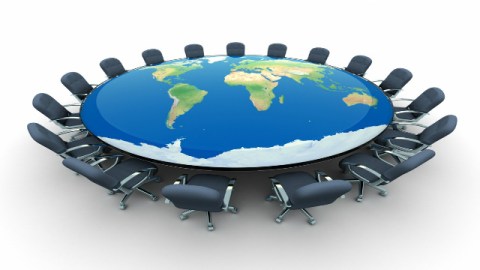What Will It Take to Make Global Governance Work?

Leaving aside a few notable exceptions, the reactions to the latest UN Conference on Sustainable Development—Rio+20, as it’s widely known—read like a collective obituary for global governance. Mark McDonald catalogued some of the more memorable ones:
There are at least two (related) reasons why global cooperation has proven wanting in recent years. The World Economic Forum captured the first and most basic one in Global Risks 2011: “[T]he conditions that make improved global governance so crucial—divergent interests, conflicting incentives, and differing norms and values—are also the ones that make its realization so difficult, complex and messy.” The second reason is that domestic imperatives are becoming more urgent for the central players in the international system, compelling them to retrench and rebuild rather than make sacrifices whose domestic benefits aren’t immediately apparent. Consider the pillars of the developed world:
Emerging powers are also turning their gaze inward:
It has to rank among the central paradoxes of our time that the very phenomenon one would’ve expected to facilitate cooperation—globalization—increasingly coincides with major-power retrenchment. But what if such cooperation is overvalued, even counterproductive on occasion? Dan Drezner’s recent commentary to that effect is a reminder that terminology can end up substituting for the insight that it’s intended to produce:
Bemoaning the lack of “global leadership” is the international relations equivalent of bemoaning the failure of national leaders to possess the political will to Do The Right Thing or make the Really Big Speech that will change everything. Most of the time, “global leadership” doesn’t change a thing….The biggest problems with the global economy are almost exclusively domestic in origin at this point.
Although most continue to regard the need for global governance as self-evident, there have been growing calls for alternative arrangements in light of the global financial crisis. Because the impact of that crisis was so widespread and severe, many suspected that it would reinvigorate the complex of norms, treaties, and institutions that policymakers rely on to tackle pressing challenges. In truth, the ensuing cooperation proceeded from a preexisting dialogue mechanism between the G-20 finance ministers, not from a post-crisis innovation; furthermore, while it prevented a recession from becoming a depression—no small accomplishment—it didn’t yield much coordination on measures to mitigate the ongoing accumulation of systemic financial risk. As a result, growing numbers of observers—and not just the usual doomsayers—are warning of a repeat of 2008-09, perhaps even worse. The World Bank declared in January that “[t]he global economy has entered a dangerous phase”:
While contained for the moment, the risk of a much broader freezing up of capital markets and a global crisis similar in magnitude to the Lehman crisis remains….In the event of a major crisis, activity is unlikely to bounce back as quickly as it did in 2008/09, in part because high-income countries will not have the fiscal resources to launch as strong a countercyclical policy response as in 2008/09 or to offer the same level of support to troubled financial institutions. Developing countries would also have much less fiscal space than in 2008 with which to react to a global slowdown.
Noting that the 2008-09 downturn had failed to change “the way humanity responds to its most menacing threats,” Moisés Naím proposed a new, “minilateral” approach to addressing them:
We should bring to the table the smallest possible number of countries needed to have the largest possible impact on solving a particular problem….agreements reached by the small number of countries whose actions are needed to generate real solutions can provide the foundation on which more-inclusive deals can be subsequently built….It has become far too dangerous to continue to rely on large-scale multilateral negotiations that stopped yielding results almost two decades ago.
Naím’s insight stimulated a long-overdue discussion about the potential and logistics of smaller, more dynamic groupings (“issue-based networks,” “coalitions of interest,” and “variable geometry” were some of the conceptions to emerge). Even in a smarter minilateral context, however, all it takes is a disagreement between two players to sink a deal: take the U.S. and China, for example, in the cases of global climate and trade talks. In other domains, it only takes one holdout: consider the challenge that a Pakistan or a North Korea could (and likely would) pose if a global accord to eliminate nuclear weapons were ever forged. Scott Barrett argues that the path forward lies less in convening smaller groups than it does in articulating smaller objectives. His conclusion, writes Thanassis Cambanis,
is that what works—especially for the largest, most intractable problems—are little deals we can make now. And, indeed, if you look at the recent successes in international cooperation, they have all involved modest agreements: the eradication of smallpox, restraint in use of nuclear weapons, protection of some endangered species, worldwide bans on some harmful chemicals….The first reason to go incremental is practical: It allows us to solve specific problems, even while a broader agreement remains out of reach…And second, Barrett says, such agreements appear to work better.
Such reasons help to explain the growing interest in what nonstate actors can do on their own, particularly in slowing climate change. Echoing a point that many environmental activists made after Rio+20, The New York Timesreported that “the activity outside the main negotiating sessions here produced hundreds of side agreements that do not require ratification or direct financing by governments and that offer the promise of incremental but real progress.” Whether it’s minilateralism à la Naim or incrementalism à la Barrett, there’s clearly a need to imagine alternatives—or, at a minimum, supplements—to global governance. To that end, policymakers and thought leaders should explore at least two buckets of questions:
Those alternatives/supplements can achieve, and have already produced, extraordinary results, as Barrett discovered in surveying “a century’s efforts to resolve problems too big for a single nation.” But will those results be enough? In critical cases, yes. The remarkable reduction in global poverty over the past three decades, for example, has largely been the result of prudent policy and sustained sacrifices on the part of governments. In other cases, however—climate change, nuclear proliferation, and systemic financial risk, to name a few prominent ones—I’m not as sure. Thus arises the question that begins this post: what will it take to make global governance work? David Rothkopf has an uncomfortable answer:
What we are seeing today is the kind of failure of leadership likely to produce consequences so disturbing that ultimately they will help move us past the multilateral rhetoric of idealists to the urgency that comes of clear-eyed realism about what works, what doesn’t, and what we really need. Multilateralism will ultimately flourish not because it is more equitable but because we cannot solve global problems without it.
There are precedents for such shocks. The conclusion of the Thirty Years’ War yielded the Treaty of Westphalia, which established the system of nation-states that has largely endured to the present; and the conclusion of World War II established the international order that, while frail and weakening, remains more coherent than any alternative system. One hopes that it won’t require a war this time around to align the demands on the international system with its capacity, and there thankfully doesn’t appear to be one on the horizon. Then again, one shudders to contemplate the other sorts of outcomes that may prove necessary to do so: an act of nuclear terrorism or a global depression, for example. To folks who’re reading: am I being too gloomy?Follow Ali Wyne on Twitter and Facebook.Photo Credit: Orla/Shutterstock.com





